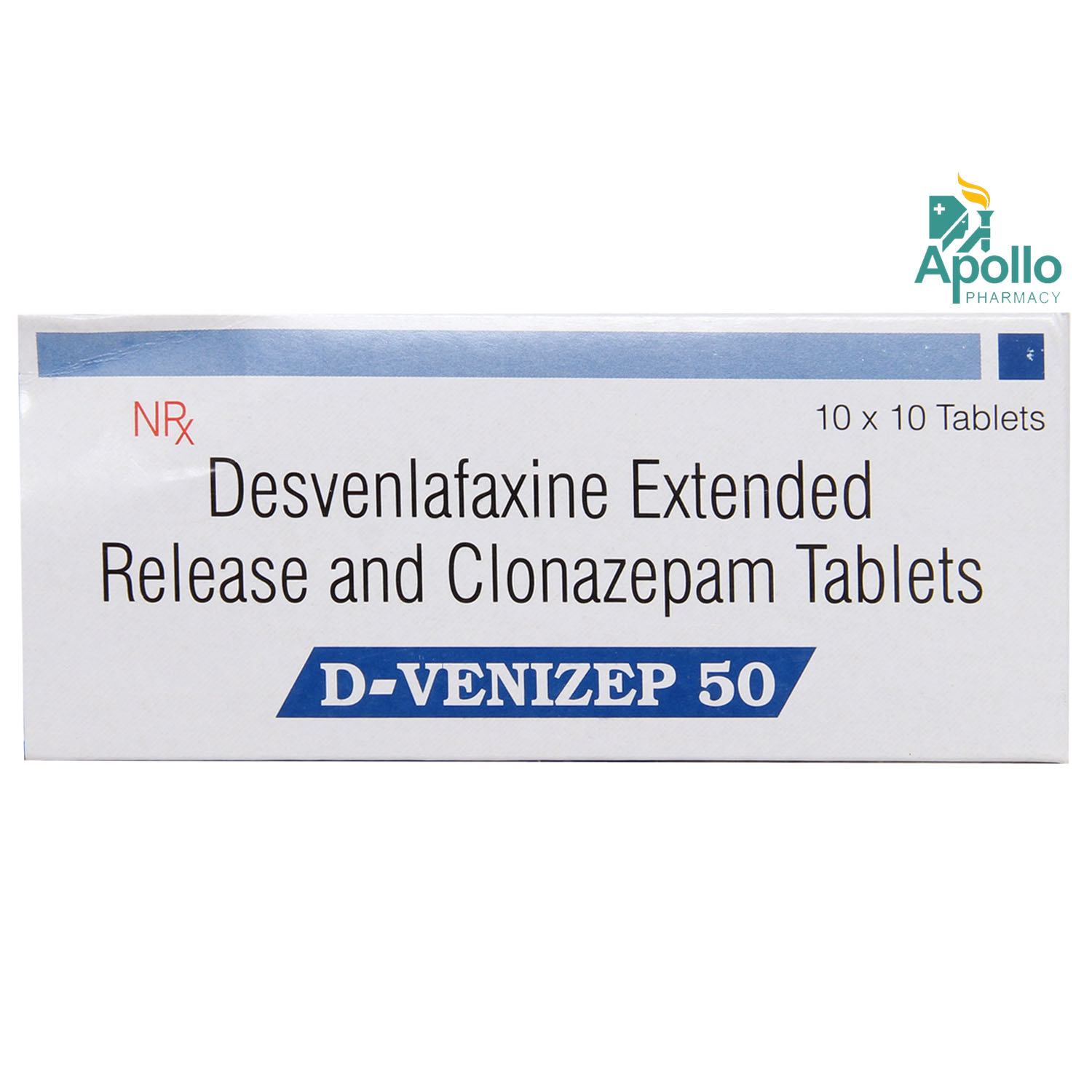Desvenlafaxine+clonazepam
About Desvenlafaxine+clonazepam
Desvenlafaxine+clonazepam belongs to a group of medicines called 'antidepressants'. It is used in the treatment of depression. Depression is a common mood disorder which negatively affects a person's daily life, described as feelings of sadness, loss, or anger. Depression symptoms can vary from mild to severe and include sadness, thoughts of death or suicide, loss of interest, weight loss or gain unrelated to dieting, trouble sleeping, loss of energy, feeling worthless or guilty, and difficulty thinking.
Desvenlafaxine+clonazepam is a combination of two drugs: clonazepam and desvenlafaxine. Clonazepam (benzodiazepine) works by increasing levels of a calming chemical, gamma-amino-butyric acid (GABA), in your brain. Desvenlafaxine (selective serotonin and norepinephrine reuptake inhibitors (SNRIs)) works by increasing the levels of chemical messengers (serotonin and noradrenaline) in the brain that helps to maintain mental balance. Together, both of them help to elevate mood and treat depression.
Take Desvenlafaxine+clonazepam with or without food. The tablet form should be swallowed as a whole with a glass of water, do not chew or crush the tablet. In some cases, you may experience common side effects such as nausea, tiredness, constipation, confusion, insomnia (difficulty in sleeping), memory impairment, uncoordinated body movements, low sexual desire, depression, erectile dysfunction, and ejaculation disorder. Most of these side effects do not require medical attention and will resolve gradually over time. However, you are advised to talk to your doctor if you experience these side effects persistently.
To treat your condition effectually, continue taking Desvenlafaxine+clonazepam for as long as your doctor has prescribed. Do not take Desvenlafaxine+clonazepam if you are pregnant or breastfeeding unless specified by the doctor. Desvenlafaxine+clonazepam causes drowsiness, and sleepiness, do not drive unless you are alert. Desvenlafaxine+clonazepam should not be given to children and adolescents aged 18 years to treat depression. Desvenlafaxine+clonazepam is habit-forming so take it only if prescribed by a doctor. Avoid consuming alcohol with Desvenlafaxine+clonazepam as it could lead to increased drowsiness and dizziness. Keep your doctor informed about your health condition and medicines to rule out any side effects.
Uses of Desvenlafaxine+clonazepam
Medicinal Benefits
Desvenlafaxine+clonazepam belongs to a group of medicines called 'antidepressants', containing clonazepam and desvenlafaxine. It is used in the treatment of depression. It improves mood, helps relieve anxiety and tension, and helps you sleep better. It also prevents extreme mood changes and increases your energy level, so you do not feel low. Clonazepam increases levels of a calming chemical, gamma-amino-butyric-acid (GABA), in your brain. Desvenlafaxine (selective serotonin and norepinephrine reuptake inhibitors (SNRIs)) works by increasing the levels of chemical messengers (serotonin and noradrenaline) in the brain that helps to maintain mental balance. Together, both of them help to elevate mood and treat depression.
Directions for Use
Storage
Side Effects of Desvenlafaxine+clonazepam
- Headache
- Nausea
- Tiredness
- Dry mouth
- Constipation
- Confusion
- Insomnia (difficulty in sleeping)
- Memory impairment
- Ejaculation disorder
- Difficulty in urination
- Uncoordinated body movements
- Depression
- Erectile dysfunction
- Low sexual desire
Drug Warnings
Do not take Desvenlafaxine+clonazepam if you are allergic to any ingredients present in it. Inform your doctor if you are taking antidepressants, antipsychotic medication, antihypertensives, or pain medication. Talk to your doctor if you have a history of seizures, bipolar disorder, suicide attempts, or schizophrenia. Patients with liver diseases, diabetes, heart disease, lung disease, and bleeding disorders should use Desvenlafaxine+clonazepam with caution. Please do not stop the treatment abruptly, as it can cause withdrawal reactions. Desvenlafaxine+clonazepam is not recommended for children and adolescents under 18 years of age as it increases suicidal tendencies in this population. Desvenlafaxine+clonazepam is habit-forming so take it only if prescribed by a doctor. Consult your doctor immediately if you experience suicidal thoughts like killing or harming yourself while on this medication. Do not take Desvenlafaxine+clonazepam if you are pregnant or breastfeeding unless prescribed. Desvenlafaxine+clonazepam causes drowsiness and dizziness, do not drive unless you are alert. Avoid consuming alcohol along with Desvenlafaxine+clonazepam as it could lead to increased drowsiness and dizziness.
Drug Interactions
Drug-Drug Interactions: Desvenlafaxine+clonazepam may have interaction with pain killers (tramadol, aspirin, acetaminophen, pethidine), narcotic pain relievers (morphine, codeine), blood thinners (warfarin), cholesterol medications (pravastatin), fits medicine (phenobarbital, phenytoin, sodium valproate, carbamazepine), anti-depression medication (aripiprazole, escitalopram), blood pressure medications (metoprolol), medications to treat stomach problems (cimetidine).
Drug-Food Interactions: Avoid consuming alcohol along with Desvenlafaxine+clonazepam as it may increase the sedative effects, and one can also experience impairment in thinking and judgment.
Drug-Disease Interactions: Desvenlafaxine+clonazepam may interact with disease conditions such as heart problems, acute alcohol intoxication, epilepsy, glaucoma, renal/liver disease, respiratory depression, and drug dependency.
Drug-Drug Interactions Checker List:
Safety Advice

Alcohol
cautionAvoid consumption of alcohol while taking Desvenlafaxine+clonazepam as it may cause an increased sedative effect.

Pregnancy
unsafeDesvenlafaxine+clonazepam may cause toxic effects on the fetus. So, it is not recommended for pregnant women or planning to become pregnant. Consult your doctor for further advice.

Breast Feeding
cautionDesvenlafaxine+clonazepam should be used with caution in breastfeeding mothers. Your doctor may advise you to stop breastfeeding while taking this medication.

Driving
cautionDo not drive or operate heavy machinery as this me Desvenlafaxine+clonazepam may cause drowsiness.

Liver
cautionDesvenlafaxine+clonazepam should be used with caution in patients with severe liver impairment. Dose adjustments may be required in such cases.

Kidney
cautionDesvenlafaxine+clonazepam should be used with caution in patients with kidney problems. Dose adjustments may be required in such cases. Consult the doctor if you have concerns about using Desvenlafaxine+clonazepam in patients with kidney problems.

Children
cautionDesvenlafaxine+clonazepam should not be used in children unless prescribed by a child specialist.
Habit Forming
Diet & Lifestyle Advise
- Maintain a healthy and well-balanced diet.
- Do not take stress as it may aggravate your condition.
- Limit alcohol intake and quit smoking.
- Engage in social activities frequently as it may improve self-esteem and confidence.
- Limit caffeine intake.
- Maintaining a healthy diet and exercising regularly helps improve overall health and boost self-esteem.
- Regularly attend therapy sessions.
- Perform meditation and yoga. This helps in relieving stress and provides relaxation.
- Follow a regular sleep pattern to improve the amount and quality of sleep you get.
- Include foods rich in omega fatty acids such as fish, nuts, fresh fruits, vegetables, and olive oils.
- Neurotransmitters are made up of amino acids. Amino acid-rich foods such as meat, dairy products, and certain fruits and vegetables help properly maintain neurotransmitters.
- Complex carbohydrates help stimulate serotonin (a feel-good neurotransmitter). These include whole grains, legumes, spinach, broccoli, oranges, and pears.
- Exercising helps in the production of the body’s natural antidepressants. It also helps relieve stress, improve mood, boost self-esteem, and provide restful sleep.
- Learn about your condition, understand the risk factors and follow the doctor’s treatment plan.
Special Advise
- Desvenlafaxine+clonazepam causes drowsiness. Avoid doing activities that require your complete focus and attention, like driving when on this drug.
- An abrupt stoppage of Desvenlafaxine+clonazepam can lead to significant withdrawal symptoms. Always discuss with your doctor about decreasing the dosage before completely stopping its usage.
- Desvenlafaxine+clonazepam is habit-forming so take it only if prescribed by a doctor.
- Avoid consuming alcohol while on this medication, as it can lead to dangerous side effects.
- Desvenlafaxine+clonazepam is unsafe for usage if you're pregnant or are planning to get pregnant. Discuss with your doctor about changing/replacing the medicine with safer alternatives.
- To avoid getting addicted to this drug, take it in prescribed quantities and as directed by your doctor. Do not self-medicate.
Patients Concern
Disease/Condition Glossary
Depression: It is a mood disorder characterized by sadness, unhappiness, anger, hopelessness, or loss that interferes with a person's daily activities. Depression can also influence some chronic health conditions and relationships. The exact cause of depression is unknown, but it may be associated with mental problems, trauma, family history, drug use, and medical conditions.
FAQs
Desvenlafaxine+clonazepam is a combination of two drugs: clonazepam and paroxetine. Clonazepam works by increasing levels of a calming chemical, gamma-amino-butyric-acid (GABA), in your brain. Desvenlafaxine works by increasing the levels of chemical messengers (serotonin and noradrenaline) in the brain that helps to maintain mental balance. Together, both of them help to elevate mood and treat depression.
When you start taking Desvenlafaxine+clonazepam, some patients might experience increased suicidal thoughts or actions. If you feel agitated or aggressive, visit your doctor. Also, do not miss any appointment with your doctor that is scheduled.
Desvenlafaxine+clonazepam causes weight gain due to increased appetite and mood changes. Eat a healthy diet and exercise regularly to maintain a healthy weight.
Do not discontinue Desvenlafaxine+clonazepam without consulting your doctor as it could lead to recurring symptoms. To treat your condition effectually, continue taking Desvenlafaxine+clonazepam for as long as prescribed. Moreover, stopping this medicine suddenly may result in withdrawal symptoms. Do not be reluctant to speak with your doctor if you feel any difficulty while taking Desvenlafaxine+clonazepam.
Desvenlafaxine+clonazepam may cause decreased sex-drive, problems with erection, and orgasm. Consult your doctor if you have any concerns regarding this.




